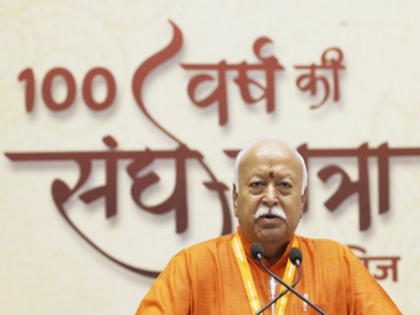At book launch, Mohan Bhagwat highlights Narmada’s importance in shaping inner consciousness
By IANS | Updated: September 14, 2025 19:20 IST2025-09-14T19:17:57+5:302025-09-14T19:20:09+5:30
Indore, Sep 14 In a deeply contemplative address at the Brilliant Convention Centre here on Sunday, Rashtriya Swayamsevak ...

At book launch, Mohan Bhagwat highlights Narmada’s importance in shaping inner consciousness
Indore, Sep 14 In a deeply contemplative address at the Brilliant Convention Centre here on Sunday, Rashtriya Swayamsevak Sangh (RSS) chief Mohan Bhagwat urged citizens to turn inward for truth and embrace spiritual discipline as a path to personal transformation and national unity.
The occasion was the release of Parikrama Kripa Saar, a book authored by Union Minister Prahlad Singh Patel, chronicling his pilgrimage along the sacred Narmada river.
Bhagwat’s speech, delivered before a packed audience of scholars, saints, and citizens, was more than a ceremonial endorsement—it was a philosophical meditation on the essence of Bharat’s spiritual heritage.
He spoke of the Narmada not merely as a river, but as a living embodiment of resilience, sanctity, and inner awakening. “Narmada is not just a river; she is a living presence,” Bhagwat said.
“She flows not only through the land but through the consciousness of those who walk beside her. The parikrama is not a journey of the feet—it is a journey of the soul.”
He described how the river, revered for centuries, offers more than scenic beauty or ritual significance. It offers lessons in surrender, patience, and the cyclical rhythm of life.
“Those who walk along her banks in parikrama don’t just witness nature—they undergo transformation,” he said.
“The river teaches you to slow down, to listen, to dissolve the ego in the flow of something greater.”
Bhagwat emphasised that the Narmada’s spiritual power lies in its quiet constancy. Unlike rivers that roar or flood, Narmada flows with grace and restraint—qualities he said are essential for both individual growth and societal harmony.
“In her silence, she speaks. In her stillness, she moves hearts,” he noted. He also praised the book’s author, Prahlad Patel, for capturing not just the physical journey but the emotional and metaphysical dimensions of the pilgrimage.
“This is not a travelogue—it is a testimony to what happens when one walks with faith, not just feet,” Bhagwat said.
His words resonated with the audience, many of whom had undertaken the parikrama themselves, and served as a reminder that the path to national renewal begins with inner inquiry.
Speaking to a packed audience, the RSS chief Bhagwat emphasised that while science relies on external evidence, spiritual traditions in Bharat are rooted in direct inner experience.
“What is scientific is best supported by evidence,” he said.
“But today’s scientists seek proof outside, while our shraddha—our inner faith—offers its own direct evidences. To access those, one must make sincere efforts and undergo personal experimentation.”
He invoked the symbolic form of “Bhawani Shankar” to illustrate the union of shraddha (faith) and vishwas (trust), asserting that divinity resides within.
“God is within,” the RSS chief declared.
“But the modern world has stopped seeking truth inside. The belief that ‘nothing exists’ is a delusion. In all names and forms, there is only One. Diversity is a myth—persistent truth lies in unity.”
The RSS chief Bhagwat linked this spiritual insight to the roots of global conflict, attributing unrest to the dualistic mindset of “me and mine” versus “you and yours".
He noted that while this division has persisted through history, it is not permanent.
“Our ancestors discovered that this sense of separation is temporary. They also taught that it does not last forever.”
Calling for sadhna (spiritual discipline), Bhagwat encouraged the audience to pursue inner clarity through various paths. “There are many ways to do sadhna,” he said. “But one must pass through the phase of confusion and conflict to reach clarity.”
In a lighter moment, Bhagwat cited a theatrical portrayal of Aurangzeb, where the actor, breaking character, shouted in English: “Get out! You cannot conquer upon them.”
The anecdote, though brief, underscored the futility of external domination when inner conviction remains unshaken. Bhagwat’s speech blended metaphysical reflection with cultural commentary, urging listeners to transcend superficial divisions and rediscover the unity that underlies all existence.
His remarks come at a time when debates around science, tradition, and national identity continue to shape public discourse across India.
Disclaimer: This post has been auto-published from an agency feed without any modifications to the text and has not been reviewed by an editor
Open in app